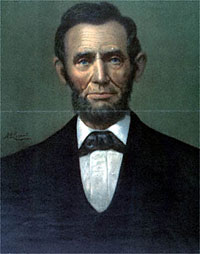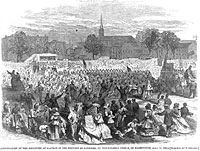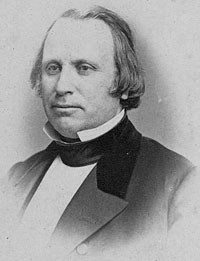Until the Civil War, the nation’s capital was a center of the slave trade. Lincoln biographer Paul Findley wrote that when Mr. Lincoln served in Congress, “The District was one of the busiest transfer points for slaves. They were often bought, sold, and delivered there, but still more often the District served as a depot for the transfer of slaves sold elsewhere. The public jails quartered slaves in transit, supplementing the privately owned ‘slave pens.'”1 One slave pen, Robey’s Pen, was just seven blocks from the capitol on 7th Street.
California journalist Noah Brooks later wrote: “It will be remembered that when Lincoln served his single term in Congress he introduced a bill (January [10], 1849) for the gradual abolition of slavery in the District of Columbia. It failed to pass. In December, 1861, Senator [Henry] Wilson, of Massachusetts, introduced bills in the Senate providing for the immediate emancipation of all slaves in the District of Columbia, and the payment to loyal owners of an average sum of three hundred dollars per head, and providing for the appointment of a Board of Commissioners to assess the amounts to be paid to each slave owner, and appropriating one million dollars for that purpose. Singularly enough, this measure was at first opposed by a considerable number of Democratic Senators whose loyalty to the Union was not for a moment questioned. Senator [William] Willey of West Virginia, for example, opposed the bill in a speech in which he insisted that the policy of the Union party had nothing whatever to do with the abolition of slavery or with its maintenance; that the slavery question was one entirely outside of all measures of the preservation of the Union. The debate ran on several days, and during that time a great many decent-looking and intelligent-appearing colored men thronged to the Senate to hear what the speakers had to say on the general question. Garrett Davis said he was astonished at the impudence of these colored people, who were concerned to know whether they were to be property or free men; and in a particularly vituperative speech, one afternoon, he called attention to the predominance of black people in the galleries, and said: ‘A few days ago, I saw several Negroes thronging the open door of the Senate and listening to the debate on this subject. I suppose in a few months they will be crowding white ladies out of the galleries!’ Senator Davis’s opinion of was that the liberation of the slaves in the rebellious States would be of no avail, because as soon as the States should be reorganized as an integral part of the Union, ‘the white inhabitants of those States would reduce the slaves again to a state of bondage or would expel them from their borders and hunt them like wild animals.’ But notwithstanding the opposition of such men as the erratic Kentuckian, the Wilson bill finally passed the Senate by 29 votes to 6.2
Lincoln biographer Isaac Arnold, who served in Congress for most of the Civil War, wrote: “Senator Wilson, of Massachusetts, the confidential friend of the President, on the 15th of December introduced a bill for the immediate emancipation of slaves in the District of Columbia, and the payment to their loyal masters of an average sum of three hundred dollars for each slave thus set free; providing for the appointment of commissioners to assess the sums to be paid each claimant, and appropriating one million of dollars for the purpose. The debates upon this bill involved the whole subject of slavery, the rebellion, the past, present, and future of the country. The bill passed the Senate by yeas twenty nine, nays six.”3 The Senate voted on April 3 to abolish slavery in District of Columbia and two days later, President Lincoln indicated he would sign the legislation. The bill’s opponents in the House, however, seemed intent on delay and destroy tactics.
“In March, 1862, to the accompaniment of heated oratory, the Senate took up the bill for emancipation in the District. The slaves were to be freed immediately, but loyal masters were to receive compensation at an average of three hundred dollars per slave. Moreover, an amendment appropriated money for a project dear to Mr. Lincoln’s heart, one to which he strongly adhered and with which he unsuccessfully experimented – the colonization of such freed blacks as might wish to leave the country,” wrote historian Margaret Leech. “Neither compensation nor the hope that some Negroes might take their departure calmed the anxiety of the capital’s citizens. In their eyes, the abolitionists were bent on making the District ‘a hell on earth for the white man.’ The board of Aldermen passed a resolution which urged Congress to provide…safeguards against converting this city…into an asylum for free negroes, a population undesirable in every American community.’ The Star indignantly took it for granted that owners of valuable slaves would lose no time in placing them beyond the reach of Congress. According to observers of Republican sympathies, there was a great exodus of blacks by train and wagonload to Maryland. The Baltimore slavepens were reported to be crowded. A few owners undoubtedly persuaded their slaves to leave. The provost marshal remarked that a number of these apparently compliant chattels seized the opportunity to escape altogether.4
Senator Charles Sumner’s biographer Moorfield Storey wrote: “Sumner spoke in favor of the bill on March 31, addressing himself especially to the doubt of anti-slavery men whether it was right to acknowledge property in man by paying the owners for their slaves. To many it seemed that the payment should be made to the slaves. Sumner urged compensation: first, because Congress had recognized and supported slavery in the District, thus making the whole country responsible for the wrong, and therefore properly chargeable with the expense of righting it; second, because it was the most practical way of removing slavery. To meet the scruples of friends, he called the payment ransom…”5
“The struggle to take up the bill came on the 10th of April, under the lead of that accomplished, adroit, and bold parliamentarian, Thaddeus Stevens. He moved that the House go into committee, which motion was agreed to, Mr. [Henry] Dawes of Massachusetts in the chair. The chairman called the calendar in its order, and on motion of Mr. Stevens every bill was laid aside until the bill for the abolition of slavery in the District was reached. An unsuccessful effort to lay the bill on the table was made by a member from Maryland,” wrote Isaac Arnold.6
Journalist Noah Brooks wrote: “Thaddeus Stevens had charge of the bill when it came up in the House early in the following April. It was opposed in the House by the same class of politicians that had fought it in the Senate. Even so liberal a Democrat as John J. Crittenden spoke and voted against the bill, and [Charles A.] Wickliffe of Kentucky said: ‘I hope the friends of this bill will not so far outrage the laws of the District as to authorize slaves or free Negroes to be witnesses in any case before the courts.’ [Clement] Vallandigham also opposed the measure with great vehemence, and declared that there were not ten men in the next preceding Congress who would have voted for the abolition of slavery in the District of Columbia. But the bill passed the House by a vote of 92 to 38.”7
Isaac Arnold noted: “Mr. [John A.] Bingham closed an eloquent speech by saying: ‘One year ago (11th April, 1861) slavery opened its batteries of treason upon Fort Sumter at Charleston; let the anniversary of the crime be signalized by the banishment of slavery from the national capital.”8 Arnold noted that President Lincoln said: ‘Little did I dream in 1849, when I proposed to abolish slavery at this capital, and could scarcely get a hearing for the proposition, that it would be so soon accomplished.’ Still less did he anticipate that he as president would be called upon to approve the measure.”9 When President Lincoln did not immediately sign the legislation, Sumner complained: “Do you know who at this moment is the largest slaveholder in this country? It is Abraham Lincoln, for he holds all the three thousand slaves of the District, which is more than any other person in the country holds.”10 President Lincoln addressed his message to Congress on April 16, 1862:
Fellow citizens of the Senate, and House of Representatives.
The Act entitled “An Act for the release of certain persons held to service, or labor in the District of Columbia” has this day been approved, and signed.
I have never doubted the constitutional authority of congress to abolish slavery in this District; and I have ever desired to see the national capital freed from the institution in some satisfactory way. Hence there has never been, in my mind, any question upon the subject, except the one of expediency, arising in view of all the circumstances. If there be matters within and about this act, which might have taken a course or shape, more satisfactory to my jud[g]ment, I do not attempt to specify them. I am gratified that the two principles of compensation and colonization, are both recognized, and practically applied in the act.
In the matter of compensation, it is provided that claims may be presented within ninety days from the passage of the act “but not thereafter”; and there is no saving for minors, femes-covert, insane or absent persons. I presume this is an omission by mere over-sight, and I recommend that it be supplied by an amendatory or supplemental act.11
During the transition, when asked if he had considered emancipation of slaves in the District of Columbia, President-elect Lincoln replied: “Upon my word I have not given the subject a thought.”12 Fourteen months later, Mr. Lincoln had clearly given it much thought. Illinois Senator Orville H. Browning visited President Lincoln on April 14 to discuss the pending legislation. “He told me he would sign the bill, but would return it with a special message recommending a supplemental bill making savings in behalf of infants &c. And also some other amendments,” Browning wrote in his diary that night. “He further told me he regretted the bill had been passed in its present form – that it should have been for gradual emancipation – that now families would at once be deprived of cooks, stable boys &c and they of their protectors without any provision for them. He further told me that he would not sign the bill before Wednesday – That old Gov [Charles] Wickliffe had two family servants with him who were sickly, and who would not be benefitted by freedom, and wanted time to remove them, but could not get them out of the City until Wednesday, and that the Gov had come frankly to him and asked for time. He added to me that this was told me in the strictest confidence.”13
According to Noah Brooks, “This famous act was finally approved by the President, and became a law on April 16, 1862, and great was the jubilation, not only throughout the District, but all over the loyal States. The city of Washington was the scene of a remarkable parade, alleged to be made up of free Negroes, but as a matter of fact it was not until months after that that the freedom was attained in the District.”14
Historian Leech wrote: “The emancipation bill was passed in both Houses, and on April 16, 1862, was signed by the President. In an attempt to atone to ex-Mayor Berret for his summary arrest and detention in Fort Lafayette, Mr. Lincoln offered him a place on the commission to award compensation for the freed slaves; but the honor was declined. Early in May, the commission was receiving the petitions of the owners, while the long lists of itemized human property, to be examined and valued by a Baltimore slave dealer, began to appear in the newspapers. Eventually, about one thousand persons in the entire District presented claims for three thousand, one hundred and twenty-eight slaves. There were a few applications – mainly those of ladies advanced in years – in which the evidence warranted the commissioners in withholding payment. It was refused for one hundred and eleven slaves in all, either because of the disloyalty or the defective titles of the owners. Among those who received their money was a free Negro, who asked compensation for a wife he had purchased, and for the half-dozen children born of the union. At least, this fact was vouched for by Horace Greeley, the pink-faced, goggle-eyes, anti-slavery editor of the New York Tribune.”15
Lincoln chronicler William K. Klingaman wrote: “In Washington, a free Negro went to tell a slave woman that the government had set her free. He found her with another slave, ‘talking relative to the Bill expressing doubts of its passage & when I entered they perceived that something was ahead and immediately asked me ‘Whats the news?’ The Districts free says I pulling out the ‘National Republican‘ and reading its editorial when I had finished the chambermaid left the room sobbing for joy. The slave woman clapped her hands and shouted, left the house saying ‘let me go and tell my husband that Jesus has done all things well.’…Were I a drinker I would go on a Jolly spree today but as a Christian I can but kneel in prayer and bless God for the privilege I’ve enjoyed this day.”16
Margaret Leech wrote: “With enfranchisement an accomplished fact, Congress provided public schooling for the Negro children of the District. Meantime, the capital was preparing to stage its own political contest for the election of mayor and members of the city councils. The contenders in the miniature arena of the municipality corresponded with the two branches of the Democratic party in national affairs; the War Democrats, who had rallied to the support of the Union; and the Peace Democrats, who decried the administration and opposed the war. In Washington, the loyal faction was called the Unconditional Union party. Its candidate for mayor was the incumbent, Mr. Richard Wallach, the brother of Douglas Wallach, the proprietor of the Star. In the two preceding elections, Richard Wallach had run against [James] Berret and been defeated. At the time of Berret’s arrest and enforced resignation, he was serving as president of the Board of Aldermen, and was elected mayor by the city councils for the unexpired term.17
California journalist Noah Brooks recalled: “One morning in the latter part of January, 1863, while passing through the Treasury Department, I noticed a large crowd of persons gathered in a corridor and waiting their turn to enter Room No. 18. My curiosity was satisfied when I found that the Commissioners appointed by Congress, attended by their clerk and the cashier of the Sub-Treasury, were paying for the emancipated slaves of the District. Think of it! As the claimants walked up one after another and gave their names, the Commissioners’ clerk looked up the number of the claim and the Sub-Treasury cashier produced a check which bore the same number. Thereupon the claimant signed a receipt, received his check, and went to General [Francis] Spinner, United States Treasurer, where he signed another receipt, and the check, being duly countersigned, was payable at the Sub-Treasury. About three hundred persons were then in line waiting their turn for payment. Three or four days were required to settle all the claims of the ex-slaveholders, and when the accounts were eventually balanced it was found that the total amount of money paid for slaves purchased in the District of Columbia by act of Congress was considerably within the sum appropriated – one million dollars. It should be said that some of the more radical Republican members of Congress opposed the abolition bill on the ground that it was wicked to pay for slaves, thus recognizing the right of property in human beings. Their attitude was like that of the Prohibitionists of the present day, who would refuse licenses to liquor-dealers on a somewhat similar principle. But compensated emancipation was at that time considered by most sensible people as the easiest and most practicable solution of the great impending difficulty – the abolition of slavery.”18
Footnotes
- Paul Findley, A. Lincoln, The Crucible of Congress: The Years Which Forged His Greatness, p. 127-128.
- Herbert Mitgang, editor, Washington, D.C., in Lincoln’s Time: A Memoir of the Civil War Era by the Newspaperman Who Knew Lincoln Best: Noah Brooks, p. 180-181.
- Isaac N. Arnold, Abraham Lincoln, p. 243.
- Margaret Leech, Reveille in Washington, p. 241-242.
- Moorfield Storey, Charles Sumner, p. 206.
- Isaac N. Arnold, Abraham Lincoln, p. 243.
- Herbert Mitgang, editor, Washington, D.C., in Lincoln’s Time: A Memoir of the Civil War Era by the Newspaperman Who Knew Lincoln Best: Noah Brooks, p. 181-182.
- Isaac N. Arnold, Abraham Lincoln, p. 244.
- Isaac N. Arnold, Abraham Lincoln, p. 244.
- Moorfield Storey, Charles Sumner, p. 207.
- Roy P. Basler, editor, The Collected Works of Abraham Lincoln, Volume V, p. 192 (April 16, 1862).
- Don E. and Virginia E. Fehrenbacher, editor, Recollected Words of Abraham Lincoln, p. 7 (printed in New York Times, January 14, 1861).
- Theodore Calvin Pease, editor, Orville Hickman Browning, Diary of Orville Hickman Browning, Volume I, 1850-1864, p. 541 (April 14, 1862).
- Herbert Mitgang, editor, Washington, D.C., in Lincoln’s Time: A Memoir of the Civil War Era by the Newspaperman Who Knew Lincoln Best: Noah Brooks, p. 181-182.
- Margaret Leech, Reveille in Washington, p. 242.
- William K. Klingaman, Abraham Lincoln and the Road to Emancipation, 1861-1865, .
- Margaret Leech, Reveille in Washington, p. 242.
- Herbert Mitgang, editor, Washington, D.C., in Lincoln’s Time: A Memoir of the Civil War Era by the Newspaperman Who Knew Lincoln Best: Noah Brooks, p. 182-183.






